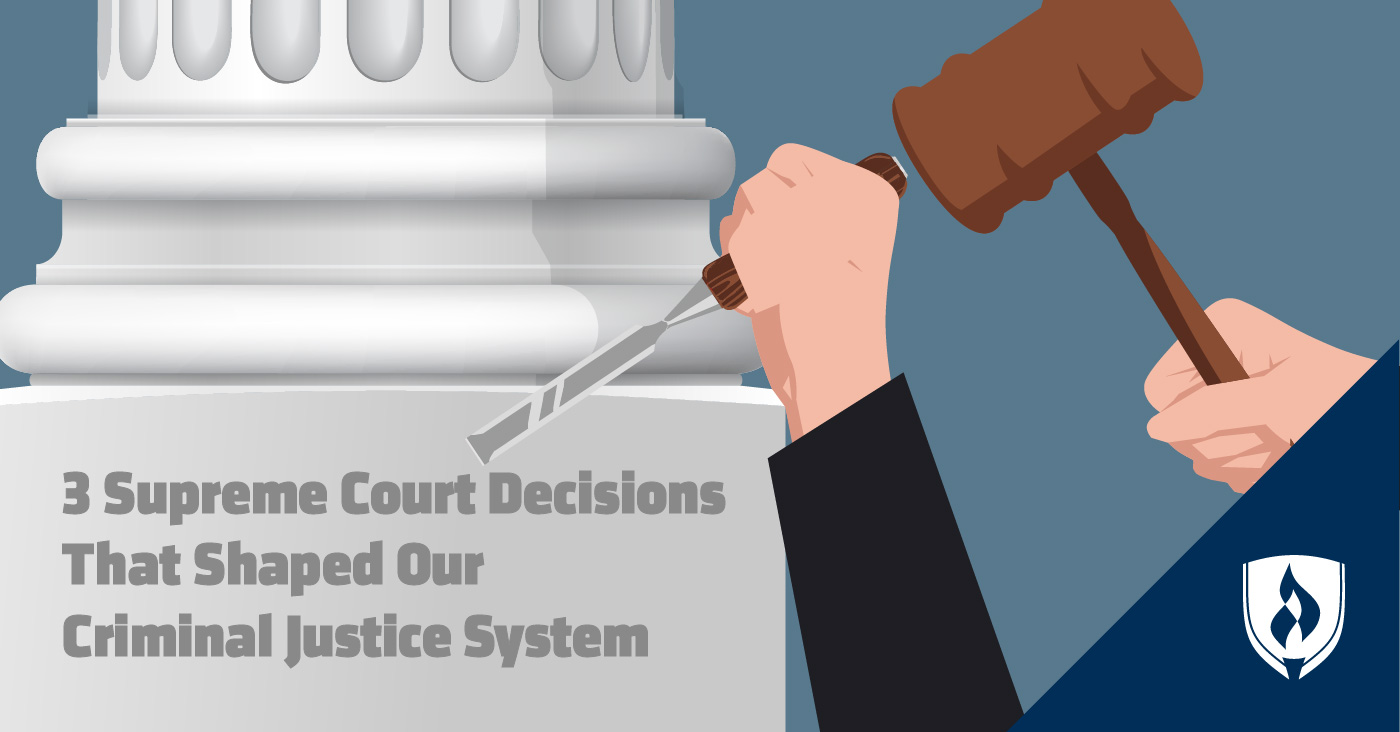3 Supreme Court Decisions That Shaped Our Criminal Justice System
By Kristina Ericksen on 12/31/2018

The Supreme Court is the highest court in the U.S.—the final arbiter of the law. It acts as a guardian and interpreter of the Constitution and the rights it affords individuals. Unusual and controversial cases are escalated to the Supreme Court, and the rulings they make guide the way on legal decisions and procedures for decades to come. Decisions the Supreme Court makes become law of the land in the U.S.
Throughout modern history, several landmark Supreme Court decisions proved highly impactful and influential on the criminal justice field. Their legacies shaped our laws, proceedings and systems to what we know them as today. And these Supreme Court decisions remain as relevant as ever, even half a century later.
3 Influential Supreme Court decisions you should know
Keep reading to learn about a few highly impactful Supreme Court decisions and how they forever altered the justice system throughout the U.S.
1. Mapp v. Ohio, 1961
Result in brief: Illegally obtained evidence cannot be used in criminal prosecutions in state courts.
In 1957, Cleveland police suspected local resident Dollree Mapp of harboring a fugitive. When Mapp refused to let police enter her home without a warrant, police officers broke down her door and began their search of the property. During the raid, they discovered obscene books and arrested her for their possession. Mapp was convicted, but the ruling was overturned by the Supreme Court, which determined that police violated Mapp’s Fourth Amendment rights.
Through the Fourth Amendment, Americans are protected from unreasonable search and seizure by the government. The Mapp vs. Ohio ruling determined that evidence illegally obtained cannot be used against a defendant in court. This wasn’t a new concept at the time of this case—federal courts prohibited the use of illegally obtained evidence in criminal cases, but no such precedent was set for state courts.
The legacy of Mapp v. Ohio ensures that criminal defendants can only be tried with evidence that is legally obtained; evidence acquired outside of the bounds of the law remains inadmissible in court to this day. This places a higher bar for investigative conduct—law enforcement must be diligent in order to avoid violating the accused’s right to due process.
2. Gideon v. Wainwright, 1963
Result in brief: Defendants in all criminal cases must be provided legal counsel if they cannot afford it.
In 1961, Clarence Earl Gideon was arrested and charged with a felony in the state of Florida—breaking and entering with the intent to commit a misdemeanor. A drifter with an eighth grade education, Gideon was unable to afford his own attorney and asked the judge to provide him with legal counsel. Gideon’s request was denied—at the time, the precedent was that only defendants tried in capital offenses were provided with legal representation.
Gideon represented himself in his trial, cross-examining witnesses and arguing for his innocence, but was found guilty and sentenced to five years in prison. While in prison, Gideon crafted his own appeal and petitioned his conviction to the Supreme Court, who agreed to examine his case and determined it was a violation of Gideon’s Sixth Amendment right to legal counsel.
“The whole course of American legal history has been changed,” said then-Attorney General Robert F. Kennedy in response to the ruling. He was right—the landmark decision left an enormous impact on the law, ensuring the most vulnerable defendants would have access to legal representation and their Sixth Amendment rights would be protected. This ruling ensured the right to legal counsel was evenly applied across all states as well.
The ruling remains critical to this day; a large portion of the accused do not have the means to hire legal counsel. While there are still plenty of issues with the public defender system that grew as a result of the ruling, this case helps ensure the accused aren’t stuck defending themselves without trained legal counsel.
3. Miranda v. Arizona, 1966
Result in brief: Suspects in police custody must be informed of their constitutional rights.
In 1963, Phoenix police arrested local resident Ernesto Miranda for robbery, kidnapping and rape. Prior to the police interrogation, Miranda was not informed of his constitutional right to an attorney and against self-incrimination. During the interrogation, Miranda confessed to the committing the crimes. Police built their case on the recorded confession, and Miranda was found guilty. He was sentenced to 20 to 30 years in prison.
While incarcerated, Miranda appealed to the U.S. Supreme Court, who struck down his conviction on the grounds that Miranda was not properly informed on his Fifth Amendment rights against self-incrimination.
Under the Fifth Amendment, individuals are guaranteed to fair trials and protected from double jeopardy. They also have the right against forced self-criminalization. Defendants are privileged with the right to “plead the Fifth” and refute an answer that may incriminate them.
The legacy of Miranda v. Arizona continues to have a strong grasp over the criminal justice system today. Whenever a suspect is within custody of law enforcement, they must be read their Miranda Rights. Statements obtained in custody with no Miranda rights given cannot be used in trial.
“You have the right to remain silent. Anything you say can and will be used against you in a court of law. You have the right to an attorney. If you cannot afford an attorney, one will be provided for you. Do you understand the rights I have just read to you? With these rights in mind, do you wish to speak to me?”
The legacy of the Miranda vs. Arizona ruling remains to this day. Police officers and investigators must memorize the Miranda Rights as a fundamental part of their training. While new in the 1960s, these lines are now ingrained within the public consciousness as a cornerstone of modern day arrest procedures.
From landmark rulings to legal legacies
These three landmark Supreme Court decisions shaped our criminal justice system in significant ways by partially shifting the power dynamic in favor of the accused. Though decades have passed, their legacies still stand strong, guiding legal policies and procedures in our courtrooms today and striking a balance between individuals’ rights and the law.
If you’re interested in criminal justice, have you considered making a career of it? The field needs dedicated individuals like yourself to protect citizens and uphold the law. It’s a field that’s home to many different types of careers—and everyone plays a critical role in ensuring justice is served.




